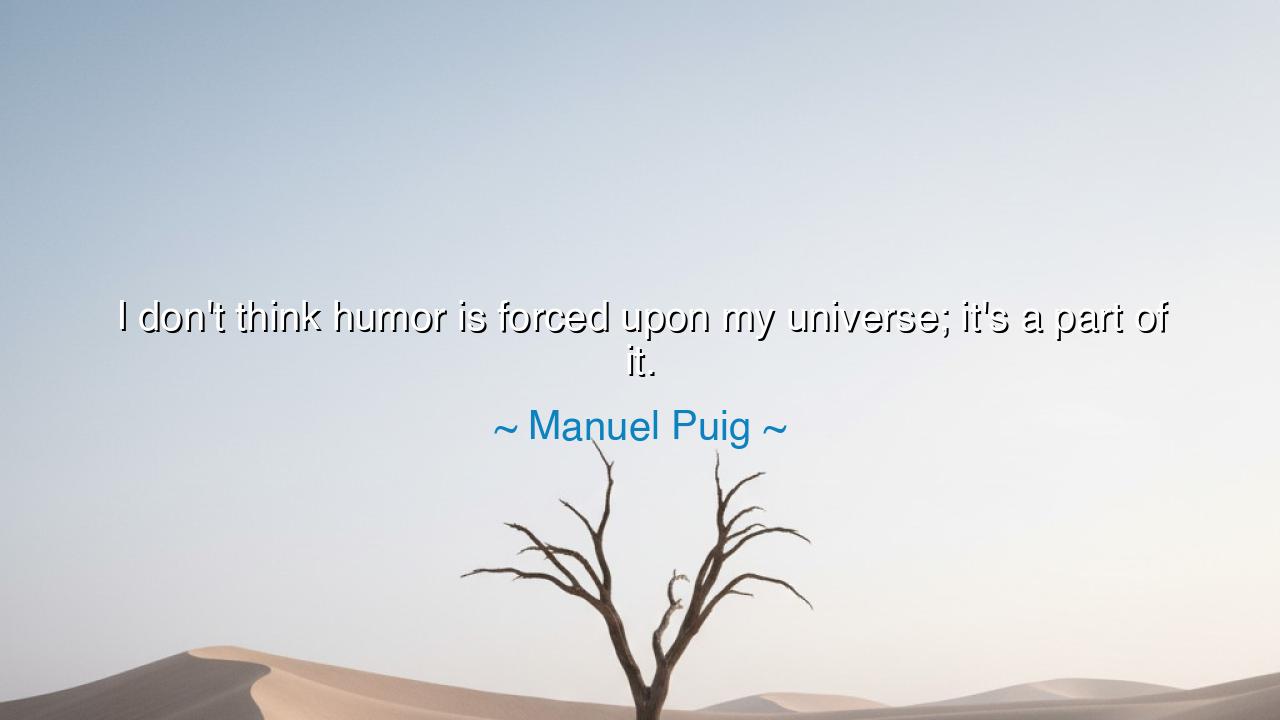
I don't think humor is forced upon my universe; it's a part of






In the ever-unfolding story of the human experience, there exists a profound truth, one that has been recognized by the great thinkers of all ages: humor is not a mere ornament to life, nor is it something that can be forced into existence. It is, as Manuel Puig wisely says, "a part of it." The recognition that humor is a natural and essential thread woven through the very fabric of our being is not only a testament to the power of laughter, but also a reflection of our innate resilience and creativity in the face of the often harsh realities of existence. Puig’s insight calls us to embrace humor as an inherent part of the universe—an energy that does not need to be manufactured but arises naturally from the complexities of life.
The ancients understood this truth deeply. The great Greek philosophers, such as Aristotle, viewed humor not as a fleeting pleasure, but as a vital aspect of human nature. In his work Rhetoric, Aristotle describes humor as a tool of communication, one that can convey wisdom, reveal the contradictions of society, and even heal emotional wounds. Humor, he suggested, is often an expression of wisdom—an ability to perceive the absurdities of life with a light heart, to recognize that the world’s complexities can be both tragic and comic, and to find the beauty in that balance. In this light, Puig’s statement becomes an echo of ancient wisdom: humor is not an external force, but a natural reflection of the universe’s profound contradictions.
Consider the example of Socrates, the great philosopher of ancient Athens, who, despite his serious contributions to the world of thought, was known for his playful wit. In his dialogues, Socrates would often use humor as a way to expose the flaws in the arguments of his contemporaries, drawing out their contradictions with a well-timed jest. Yet this was no mere tactic for entertainment; it was a method for unearthing deeper truths. Socrates knew that humor, when wielded wisely, could reveal the absurdities in human thinking and society, and in this way, it was a part of his quest for truth. Puig’s words, then, remind us that humor is not something extraneous to the human condition, but something fundamental, a tool that helps us navigate the complexities of life.
In Rome, Juvenal, the great satirist, also understood that humor, particularly in the form of satire, could reveal the most profound truths about society. His sharp, biting wit was directed at the decadence of Roman life, exposing the moral and political failings of the elite. Yet even in his criticism, there was an underlying humor—a recognition that the absurdities of life must be met not only with critique but with laughter. Humor, for Juvenal, was not a forced imposition but a natural response to the dissonance between human ambitions and the realities of the world. It was a part of his universe, a way to cope with the inevitable disappointments of life.
In the world of literature, Shakespeare also knew that humor was not something that could be forced, but something that naturally arose from the complexities of the human heart. His plays, filled with moments of deep tragedy and great comedy, reveal a world where laughter and tears coexist in a delicate dance. In works like Twelfth Night and A Midsummer Night's Dream, Shakespeare blends humor and seriousness to show the complexities of love, power, and human folly. His characters often find themselves in absurd situations, yet it is through these comic moments that they are brought to deeper understanding. Like Puig, Shakespeare understood that humor is woven into the very fabric of existence—it is not something that can be contrived but something that emerges naturally from the conditions of life.
The great lesson here is clear: humor is an intrinsic part of the human experience. It is not an afterthought or an addition to the world’s weighty matters, but a force that emerges from the very contradictions and complexities of existence. Whether in the ancient Greeks, the Romans, or the great writers of literature, we find that humor is a natural response to the absurdities and challenges of life. It is not something that is forced upon us, but something that is part of the fabric of our universe, a tool to help us navigate the struggles of existence with grace and clarity.
In our own lives, let us take this wisdom to heart. When faced with the difficulties of life, let us not shy away from humor, but embrace it as a vital part of our journey. Let us recognize that humor is not an escape from the truth, but a way of illuminating it, of revealing the contradictions and absurdities that shape our world. Like Socrates, Juvenal, and Shakespeare, we can use humor to find deeper truths about ourselves, our society, and the world. Let us live with the understanding that humor is not something that is forced upon us, but something that is naturally woven into the universe, offering us the strength to face life’s most difficult moments with a lighter heart and a sharper mind.
In embracing this natural humor, we learn to balance the serious and the comic, the tragic and the lighthearted, understanding that laughter is as necessary as tears. Let humor guide us through life, not as a distraction, but as a tool for deeper insight and greater resilience. Through this, we can live in harmony with the natural rhythms of existence, finding joy in the world’s contradictions, and in doing so, growing ever wiser.






AAdministratorAdministrator
Welcome, honored guests. Please leave a comment, we will respond soon